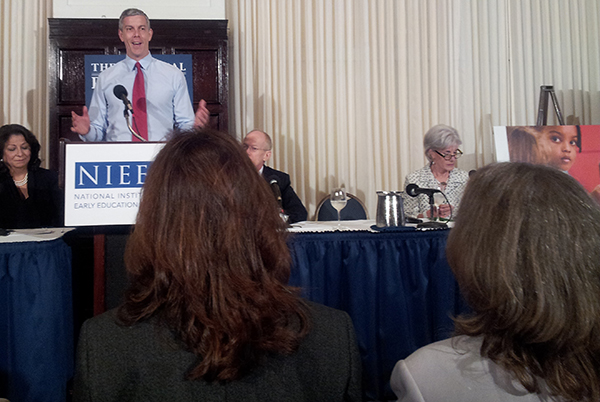
Secretary of Education Arne Duncan delivered his remarks on how budget cuts have impacted preschools on Monday in Washington. (Brina Monterroza/Medill News Service)
WASHINGTON – State funding for preschool saw one of the largest cuts in nearly a decade, according to a new report released Monday.
The annual report, “The State of Preschool 2012,” released by Rutgers University’s National Institute for Early Education Research, said enrollment in state preschool programs stalled over the past year.
“The state of preschool in America is a state of emergency,” said Steven Barnett, director of the institute.
More than half a million children were enrolled in programs that barely met the institute’s quality standard benchmarks. The 10 principles are:
- Comprehensive early learning standards
- Teachers with a bachelor degree
- Teachers with specialized training in early childhood
- Assistant teachers with a Child Development Associate credential or the equivalent
- Teacher in-service training of at least 15 hours a year
- Maximum class sizes of 20 or lower
- Staff to child ratios of 1-to-10 or better
- Vision, hearing and health screening and referral and support services
- Providing at least one meal a day
- Site visits at least every five years
“That’s no way to create a world-class education system and it’s no way to put our students on a path to college and career readiness,” said Secretary of Education Arne Duncan at a briefing.
The president of American Federation of Teachers, the union that represents teachers, said the administration’s “Preschool-for-All” proposal comes at “the right time.”
The proposal calls for $75 billion over 10 years in mandatory funding to create federal-state partnerships to provide all 4-year-olds from low- and moderate-income families with access to high-quality preschool programs. Raising taxes on cigarettes and tobacco products would pay for the plan.
“This the ultimate long-term play,” said Duncan about the president’s proposal.
New spending continues to be a battle in Congress. Some Head Start programs have already taken a hit from sequestration. But President Barack Obama’s proposed education budget, which includes a dramatic expansion of preschool programs, would put an end to the cuts.
If all parents, advocates and businesses, come together to show the importance of investing in early childhood education that “can move Congress,” said Secretary of Health and Human Services Kathleen Sebelius.
Early childhood education affects the nation’s global competitiveness, said Jack Brennan, Vanguard chairman emeritus, who spoke at the briefing on behalf of the business community.
A 2007 study by the Economic Policy Institute, a nonprofit, nonpartisan think tank, said children who participate in high-quality preschool programs require less special education, are less likely to repeat a grade, and once in the workforce, their incomes are higher, which contribute to taxes.
In 2012, the Organization for Economic Cooperation and Development released a study that said the United States ranks 28th out of 38 countries in enrollments of 4-year-olds in early-learning programs.
Despite the bad news, enrollment for preschool increased in 17 states and in the District of Columbia. Oregon saw the highest increase, 21 percent, in the last year.
